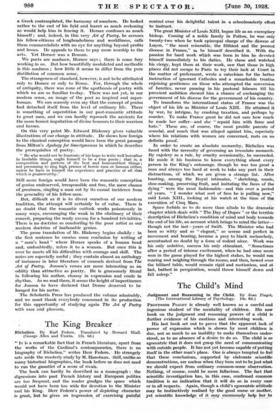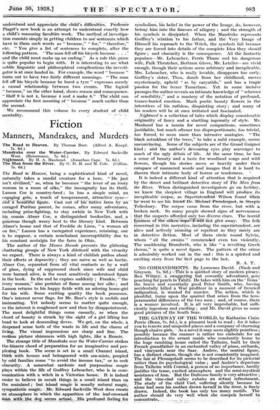The Child's Mind
Judgment and Reasoning in the Child. By Jean Piaget. (The International Library of Psychology. 10s. 6d.) PROFESSOR PIAGET is already well known as a careful and ingenious student of the mentality of children. His new book on the judgment and reasoning powers of a, child is further evidence of his cautious and interesting work.
His last book set out to prove that the apparent lack of power of expression which is shown by most children is due, not so much to an inability to make themselves under- stood, as to an absence of a desire to do so. The child is so egocentric that it does not grasp the need of communicating with outside people. It has not yet become capable of putting itself in the other man's place. One is always tempted to feel that these conclusions, , supported by elaborate scientific demonstrations, are useless when they turn out to be just what we should expect from ordinary common-sense observation. Nothing, of course, could be more fallacious. The fact that scientific investigation has, in this case, confirmed common tradition is no indication that it will do so in every case or in all respects. Again, though a child's egocentric attitude may be instinctively realized by the good nurse or mother, yet scientific knowledge of it may enormously help her to understand and appreciate the child's difficulties. Professor Piaget's new book is an attempt to understand exactly how a child's reasoning faculties-work. The method of ,investiga- tion consists simply in getting children to use' sentences_vihich have in them such words as " because," " for," " therefore," etc.- " You give a list of sentences to complete, after the following pattern. The man fell off his bicycle because . . and the child must make up an ending." As a rule this game is quite popular to begin with.- - It is interesting to see' What subtle linguistic and philosophical complications the investi- gator is at Once landed in. For example, the word " because " tams out to have two .fairly different meanings. " The man fell off-his bicycle- because- he burst a tyre " expresses merely a causal relationship between two events. The logical " because," on the other hand, shows reason and- consequence. " Half 9 is not 4, because 4 and 4 make 8." The'ehlld can appreciate the first meaning of " because " much earlier than • - . _ . We recommend this volume to every student of child mentality. the second.









































 Previous page
Previous page